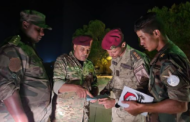Mar. 29, France reopens embassy in Tripoli after seven-year closure.
Mar. 29, militia commander Mohamed Salem, a.k.a. ‘Damona’, killed in Tripoli.
Apr. 4, first COVID-19 vaccines batch, 101,250 Sputnik vaccine doses arrive in Tripoli.
TRIPOLI
- Apr. 2, a Libyan national murdered his mother, sisters, and an 11-year-old niece in the Khalet al-Furjan area, south of Tripoli. He then buried his victims in their garden. He was arrested shortly after, and confessed to the crime;
- Mar. 30, a Libyan judge, Mohsen Busifi fled Tripoli after receiving death threats for issuing a death sentence against Ansar al-Sharia fighter, Mohamed Touati. Hamad al-Ushaibi, a spokesman for the Libyan Revolutionaries Leadership Gathering threatened to kill the judge for the verdict against Touati. Al-Ushaibi said in his tweet that carried Busifi’s photo: “This animal, who sentenced to death a member of the Libya Shield Forces, is a legitimate target for the revolutionaries”;

- Prominent Militiaman, Mohamed Salem, commonly known as ‘Damona’, was assassinated Mar. 29 in Tripoli. Witnesses confirmed that gunmen shot at Damona’s vehicle, leaving two of his bodyguards in critical conditions. The injured guards were transferred to the intensive care unit at Tripoli hospital. Damona was the Chief Security Commander in the National Salvation Government, and one of the leaders in the Al-Samoud Brigade, led by Salah Badi.

INTERNAL AFFAIRS
- Apr. 4, the Prime Minister of the Government of National Unity (GNU), Abdelhamid al-Dabaiba held an extended meeting with a number of hospitals and medical center directors from across Libya. The meeting was also attended by Minister of Health, Dr.Ali Al-Zanati, and the Minister of State for Government and Cabinet Affairs, Adel Juma. During the talks, Al-Dabaiba addressed the challenges facing the country’s healthcare sector, especially in light of the repercussions of the COVID-19 pandemic. Around 1,000 new infections are announced daily by the National Center for Disease Control (NCDC), posing a challenge to a healthcare sector ravaged by years of conflict;
- Apr. 4, PM Al-Dabaiba announced the arrival of the first batch of COVID-19 vaccines. The same day, the Libyan Health Ministry also announced that 101,250 doses of Sputnik vaccine arrived in the capital Tripoli and will be stored at the Ministry’s storage sites.
- Apr. 4, The Director of the Moral Guidance Department of the Libyan National Army (LNA), Major General Khaled Al-Mahjoub, said that the GNU’s task is to achieve reconciliation and prepare for the elections and unify Libyan institutions. In statements to the Al-Ittihad newspaper, Al-Mahjoub explained that the new executive authority is doing a difficult job, the results of which will not appear quickly;
- Apr. 1, the National Commission for Human Rights in Libya (NCHRL) strongly denounced the continued delay in the payment of salaries of public sector employees. This is blamed on the arbitrary administrative procedures carried out by the Central Bank of Libya (CBL), and the Audit Bureau. In a statement, the commission said that such illegal practices represent a flagrant abuse of economic and political rights of the employees, and contribute to worsening their humanitarian and living conditions;
- Apr. 1, GNU Minister of Health, Ali al-Zanati ordered the formation of a new ‘Scientific Advisory Committee to Combat Coronavirus’. The committee will be chaired by Khalifa al-Bakoush and includes 27 other members. According to the Health Ministry’s decision No. 4 of 2021, the committee will be tasked with setting a guideline of scientific rules for receiving and dealing with suspected cases;
- LNA Field Marshal Haftar called for the need to hold the upcoming general elections in Libya on time. Mar. 31, the LNA’s media office broadcasted a speech by Haftar saying that “the Libyans should reunite in order to establish peace and build a unified state.” He stressed the need to hold elections on Dec. 24 “without delay”. “The armed forces are closely watching all movements and actions of outlaws and their desperate attempts to destabilize the country,” Haftar said. “The LNA will strike with an iron fist anyone who seeks to undermine the safety of citizens,” he added.

INTERNATIONAL RELATIONS
- Apr. 4, PM Al-Dabaiba received the President of the European Council, Charles Michel, at the Cabinet’s headquarters in Tripoli. Michel called for the departure of all foreign fighters and mercenaries from Libya. He also voiced support for the Government of National Unity, which is set to lead the country until general elections scheduled for December 2021;

- Apr. 3, the Libyan Minister of Economy and Trade, Muhammad Al-Hawaij, held a meeting with a delegation of Chinese governmental and private companies to discuss ways of cooperation in investments and infrastructure development in Libya. The Chinese delegation reviewed the activities of companies in the fields of construction, implementation of investment projects and infrastructure development;
- Apr. 3, the Libyan Ambassador to Italy, Omar Al-Tarhouni, held talks with the Director General for Political and Security Affairs at the Italian Ministry of Foreign Affairs and International Cooperation, Sebastiano Cardi. These talks were also attended by a number of Libyan and Italian officials in Tripoli. In a statement, the Libyan Embassy said that Al-Tarhouni discussed joint files relevant to the two countries. These files included the starting of the highway project, along with the completion of various Memoranda of Understanding (MOU) projects, including the Prisoner and Convict Exchange Memorandum;
- Apr. 3, the Head of the Libyan State Council, Khaled Al-Meshri, called to exclude Turkish forces and their mercenaries from the program to remove mercenaries and foreign forces. This came in his meeting with French Foreign Minister, Jean-Yves Le Drian, in the absence of the Foreign Minister of the Goverment of National Unity (GNU), Najla Al Mangoush;

- Apr. 3, the Syrian Observatory for Human Rights (SOHR) confirmed that the process of returning Syrian mercenaries, loyal to Turkey from Libya, had been stalled. It noted that the group of mercenaries that left Libya Mar. 25 had not yet returned to Syria;
- Apr. 2, LPDF member Lamis bin Saad met the political advisor to the British Embassy in Libya, Benjamin Simpson. They discussed the role of the LPDF in the ongoing political process, and the exit of mercenaries and foreign forces from Libya. Simpson added that the meeting also dealt with adherence to the 24 December election date specified in the LPDF’s roadmap, and the political empowerment of women;
- a French Radio report claimed that the Head of Libya’s Presidential Council, Mohamed al-Menfi presented an official request to Turkish President, Recep Tayyip Erdogan to withdraw all Syrian mercenaries, and Turkish military experts from Tripoli;
- Apr. 1, Operation IRINI Commander, Adm. Fabio Agostini said on Thursday that the extension of the mission represents “a recognition of our effective and impartial work in implementing relevant UN Security Council resolutions.” Agostini’s speech came during the inauguration ceremony of the new force commander for the operation’s air assets and naval ships, Italian Naval Admiral Stefano Frumento to succeed the Greek Command;
- Apr. 1, The United Nation Support Mission in Libya (UNSMIL) hailed GNU’s efforts for releasing 107 prisoners of war, in a further sign of reconciliation between Libya’s rival factions. UNSMIL expressed its hope that this initiative is the beginning of a comprehensive national reconciliation program, calling for the release of all detainees before the holy month of Ramadan;
- Apr. 1, UNSG Guterres recommended establishing a “monitoring component” for the UN mission in Libya working alongside a ceasefire monitoring mechanism run by Libyans. Guterres did not mention how many UN observers would be needed for the United Nation Support Mission in Libya (UNSMIL);
- Mar. 31, NOC head Mustafa Sanalla received Chinese Ambassador to Libya, Wang Qimin and his accompanying delegation at the NOC’s HQ in Tripoli. During the meeting, they discussed enhancing joint cooperation between the two sides, with a focus on the oil sector. The discussion focused on the return of Chinese companies operating in the fields of oil, gas, energy, and construction
- Mar. 30, Russian, French and German leaders discussed the latest developments in Libya in a video conference, stressing the need to work together on resolving the crisis. Russian President Putin discussed with his French counterpart, Macron and German Chancellor, Merkel the ways to settle the Libyan crisis;
- Mar. 30, Italian FM Di Maio revealed that Rome will open a consulate in Benghazi, and an honorary consulate in the south. He talked about his visit to Libya in the previous days along with his French and German counterparts, describing it as a great sign of European unity;
- Mar. 30, US Secretary of State, Blinken held a virtual meeting with UNSG Guterres discussing the situation in Libya. Blinken welcomed the new interim Government of National Unity (GNU) in Libya, and underscored the importance of holding elections in December of this year. Blinken also stressed the need for foreign forces to depart from Libya. He pledged full support for UN Special Envoy, Jan Kubis and the United Nations Support Mission in Libya (UNSMIL). They agreed to continue close US-UN coordination on these and other matters;
- The International Criminal Court (ICC) is probing reports that the Special Forces commander in the Libyan National Army (LNA), Mahmoud Al-Warfalli was killed in the eastern city of Benghazi, the tribunal’s chief prosecutor Fatou Bensouda said Mar. 29. Al-Warfalli and two of his bodyguards were attacked outside the Arab Medical University Hospital;

- Mar. 29, France reopened its embassy in Libya after a seven-year closure, in another sign of a gradual return of stability. The French Embassy was targeted in an April 2013 car bombing that wounded two gendarmes, after which it was moved to a hotel before relocating in July 2014 to Tunis, as did most other foreign missions.


























